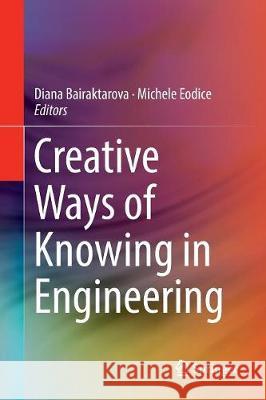Creative Ways of Knowing in Engineering » książka



Creative Ways of Knowing in Engineering
ISBN-13: 9783319841427 / Angielski / Miękka / 2018 / 234 str.
Creative Ways of Knowing in Engineering
ISBN-13: 9783319841427 / Angielski / Miękka / 2018 / 234 str.
(netto: 458,96 VAT: 5%)
Najniższa cena z 30 dni: 462,63
ok. 22 dni roboczych.
Darmowa dostawa!
Diana Bairaktarova, is an assistant professor of Engineering Education at Virginia Tech and the Director of the Creativity Inspiration Engineering Design Aptitudes and Abilities (CIEDAA) Lab. She holds an MS degree in Mechanical Engineering, an MBA, and a PhD in Engineering Education from Purdue University. Bairaktarova's ongoing research interests span from engineering to psychology to learning sciences, as she uncovers how individual performance and professional decisions are influenced by aptitudes and abilities, personal interests, and manipulation of physical and virtual objects.
Diana joined the Department of Engineering Education in the fall of 2015 after being an assistant professor of engineering practice at the University of Oklahoma's College of Engineering. She taught several fundamental and engineering design courses in the School of Aerospace and Mechanical Engineering, where the design of artifacts was addressed from a multidisciplinary perspective that includes opportunity determination through inspiration, ideation, and implementation using a design thinking framework. She is a past recipient of The University of Oklahoma Presidential Dream Course Award for her course “User-Experience Design: From Renaissance Engineering to Design for Innovation.” At University of Oklahoma Diana was also the proud faculty advisor of the Sooner-Off Road student-led team.
Diana has over fifteen years of experience working as a Design and Manufacturing Engineer. By providing applications of problem- and project-based learning in the exploration of new designs that stimulate creativity, Dr. Bairaktarova aims to prepare her students with innovative thinking and a desire to acquire new skills and knowledge, preparing them to face rapidly changing technologies. Ranging from the exploration of humanly made objects to the education of her students, she strives to enhance her students’ ability to explore and express their creativity, discover their own potential talent, and ultimately to bring their ideas to fruition.
Michele Eodice is the Associate Provost for Academic Engagement and Director of the OU Writing Center at the University of Oklahoma. She earned a Ph.D. in English, writing her dissertation on co-authoring and collaborative writing in the classroom. Eodice’s ongoing research interests include co-authoring, collaborative writing, adult and higher education, developing faculty writing at universities, and student engagement and learning through writing practices.
From 1998-2006, Eodice was the founding director of the writing center at the University of Kansas. Currently she is a professor of writing at the University of Oklahoma, and as a program director and associate provost is involved with writing across the curriculum and other initiatives, such as academic service learning and community engagement. At the University of Oklahoma, Eodice also holds affiliate faculty appointments with the Department of English and with the Adult and Higher Education program in the Jeannine Rainbolt College of Education.For many years Eodice was in leadership roles within the International Writing Centers Association, serving as president from 2007-2009. During that timeframe she traveled to several countries as a consultant in developing writing centers abroad. For six years she was a co-chair and facilitator for the IWCA Summer Institute for Writing Center Directors and Professionals.Eodice has been a director of a writing center and a leader in the field of writing centers for 20 years; she currently serves as editor of The Writing Center Journal, the primary research journal of the International Writing Centers Association.(writingcenterjournal.org)
Among her publications, two books are the products of important collaborations, (First Person)2 : A Study of Co-Authoring in the Academy (2001), written with Kami Day, and The Everyday Writing Center: A Community of Practice (2007), written with Anne Ellen Geller, Frankie Condon, Meg Carroll, and Elizabeth H. Boquet.
Eodice works extensively with faculty and graduate student writers and facilitates writing groups, camps, and retreats across the country. With Anne Ellen Geller as co-editor, she published Working with Faculty Writers (2013), a book that details the range of national best practices in programmatic support for faculty writers.
Several contributions to collections have expanded a career-long theme of work that combines understanding writing practices and students’ learning of writing with collaboration and co-authoring. One chapter, “Creativity in the Writing Center,” written with Elizabeth Boquet, appears in a 2009 award winning collection, Creative Approaches to Writing Center Work. Her interest in creativity extends to other fields as well, including engineering.
Also, with co-researchers Anne Ellen Geller and Neal Lerner, she published The Meaningful Writing Project: Learning, Teaching, and Writing in Higher Education. This study of student writing experiences and faculty connections to writing development across the disciplines continues to invite participation. (see: meaningfulwritingproject.net).
Currently at OU she focuses on supporting graduate student and faculty writers and forwarding the goals of the Writing Enriched Curriculum program.
This book offers a platform for engineering educators who are interested in implementing a “creative ways of knowing” approach to presenting engineering concepts. The case studies in this book reveal how students learn through creative engagement that includes not only design and build activities, but also creative presentations of learning, such as composing songs, writing poems and short stories, painting and drawing, as well as designing animations and comics. Any engineering educator will find common ground with the authors, who are all experienced engineering and liberal arts professors, who have taken the step to include creative activities and outlets for students learning engineering.
• Demonstrates various methods for returning to the basics of engineering education, which include design and creativity, teamwork and interdisciplinary thinking;
• Discusses a timely topic, as higher education puts more attention on the student experience of learning in all disciplines;
• Includes actual student products demonstrating “creative ways of knowing in engineering”;
• Highlights multiple ways to teach engineering concepts.
1997-2026 DolnySlask.com Agencja Internetowa
KrainaKsiazek.PL - Księgarnia Internetowa









